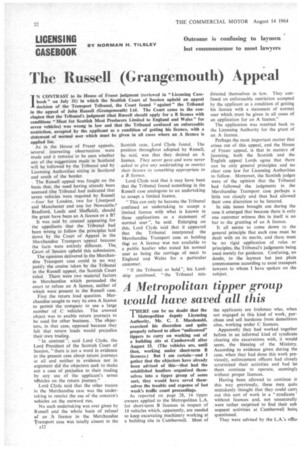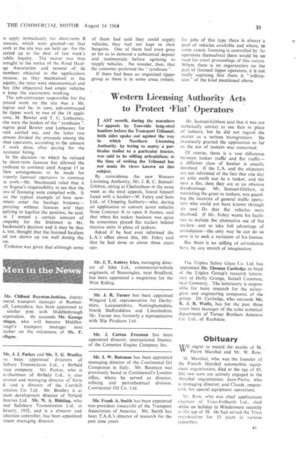A Metropolitan tipper group would have saved all this
Page 34

Page 35

If you've noticed an error in this article please click here to report it so we can fix it.
THERE can be no doubt that the I.Metropolitan deputy Licensing Authority, Mr. C. J. Macdonald, exercised his discretion and quite properly refused to allow "unlicensed" tippers to carry on working out of a building site at Camberwell after August 15. (The vehicles are, until then, working under short-term B licences.) But I am certain—and I gather that the objectors have already been advised of this—that had the established hauliers organized themselves into a tipper group of some sort, they would have saved themselves the trouble and expense of last week's traffic court proceedings.
As reported on page 28, 14 tipper owners applied to the Metropolitan L.A. for short-term B licences in respect of 18 vehicles which, apparently, are needed to keep excavating machinery working at a building site in Camberwell. Most of the applicants are Irishmen who, when not engaged in this kind of work, purchase and sell hardcore from demolition sites, working under C licences.
Apparently they had worked together before in an informal kind of syndicate clearing site excavations with, it would seem, the blessing of the Ministry. According to evidence given during the case, when they had done this work previously, enforcement officers had closely scrutinized their activities and had lei them continue to operate, seemingly without proper licences.
Having been allowed to continue ir this way previously, these men quitt mistakenly thought that they could carry out this sort of work in a " syndicate ' without licences and, not unnaturally were rather surprised to find their sub sequent activities at Camberwell beim questioned.
They were advised by thel...A.'s offici
:o apply immediately for short-term B icences, which were granted—so that work at the site was not held up—for the 3eriod up to the date of last week's mblic inquiry. The matter was thus nought to the notice of the Road Haultge Association and several of its nembers objected to the applications )ecause, as they maintained at the nquiry, the rates were uneconomical and hey (the objectors) had ample vehicles o keep the excavators working.
The sub-contractor responsible for the round work on the site as a Mr. ;ugrue and he, in turn, sub-contracled he tipper work to two of the 14 appliants, M. Bowler and T. C. Lomasney, vho were the leaders of the " syndicate ". iugrue paid Bowler and Lomasney for vork carried out, and the latter two iersons divided the proceeds among the ither operators, according to the amount if work done, after paying for the xcavator hiring.
In his decision—in which he refused he short-term licences but allowed the yndicate to continue until August 15 to how arrangements to be made for roperly licensed operators to continue. le work—Mr. Macdonald ruled that it as Sugrue's responsibility to see that the tws of licensing were complied with. It /as the typical example of how newDiners enter the haulage businessperating without licences and then pplying to legalize the position, he said. ut I sensed a certain amount of ,rmpathy for the Irishmen in Mr. lacdonald's decision and it may be that e, too, thought that the licensed hauliers ad not shown up too well during the Ise.
Evidence was given that although some Mr. Clifford Royston-Jenkins, deputy :neral transport manager at Rawtenall, Lancashire, has been appointed to similar post with MiddlCsbrough orporation. He succeeds Mr. George ringer, who will become Middles.ough's transport manager next ctober on the retirement of Mr. F. yffigoe.
Mr. J. J. Parkes and Mr. T. G. Bradley ve been appointed directors of lisbury Transmission Ltd., a Birfield -oup company. Mr. Parkes, who is :e-chairman of Birfield Ltd., is also airman and managing director of Alvis d. and a director of the Cornhill surance Co. Ltd. Mr. Bradley is at :sent development director of 3irfield dustries Ltd. Mr. N. A. Ridding, who ned Salisbury Transmission Ltd. in bruary, 1932, and is a director and Dd u ctio n controller, has" been appointed ;istant managing director. of them had said they could supply vehicles, they had not kept to their bargains. One of them had even gone so far as to demand a substantial deposit and , testimonials before agreeing to supply vehicles. No wonder, then, that the customer preferred the "syndicate ".
If there had been an organized tipper group as there is in some areas (where,
for jobs of this type there is always a pool of vehicles available and where, to some extent, licensing is controlled by the operators themselves) there would be no need for court proceedings of this nature. Where there is no organization on the part of licensed tipper operators, it is not really suprising that there is " infiltration" of the kind mentioned above.




















































































































